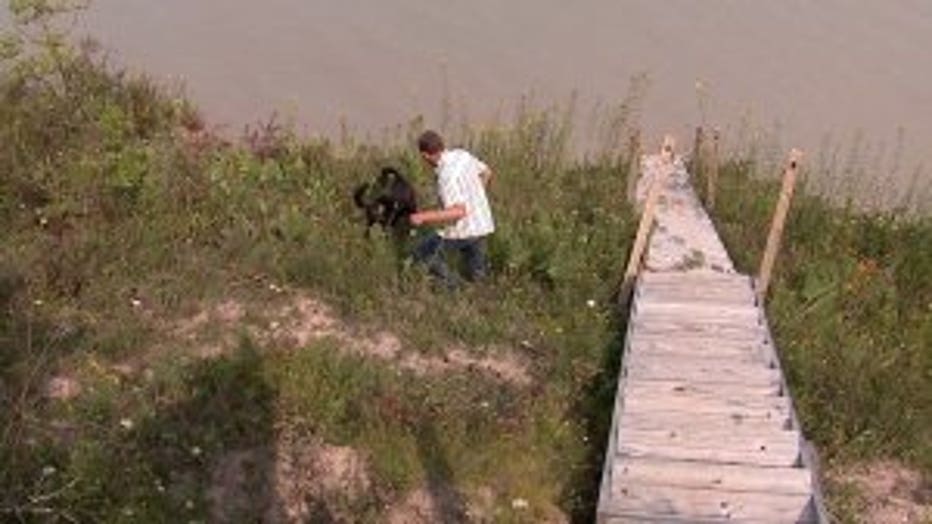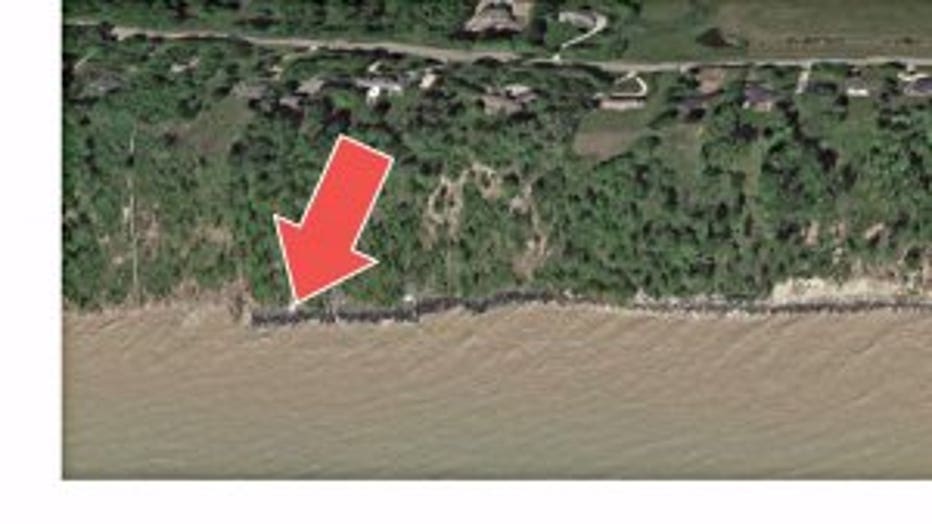Bluff failures accelerate near Concordia University years after jury finds rock wall a 'nuisance'
MEQUON -- Lake Michigan bluffs are disappearing at an alarming rate and so are the beaches below them. Now, at least one coastal engineer says the problem could be headed toward Milwaukee, unless something is done to stem the tide. FOX6 Investigator Bryan Polcyn reports a multi-million dollar project meant to preserve the bluffs could be part of the problem.
Ten years ago, Concordia University embarked on project meant to protect its lakefront campus in Mequon from rapidly eroding bluffs. But neighbors just south of the school say that project caused their bluffs to fail. Now, neighbors further down the coast have launched a new website to raise awareness of what they call continuing damage. And a University of Wisconsin professor says a disastrous chain reaction could be underway.
The path from Bob Hemke's house down to Lake Michigan is treacherous.
"I hope you brought your hiking boots," Hemke said.
But until recently, he says, it was worth every step.
"We used to keep lawn chairs and kayak down here, "Bob Hemke said.
Now, instead of leading him to the beach, the path ends at a cliff.
"Since October, we've probably lost 16 feet or more, which is more erosion than we've had in 29 years living here," Hemke said.
In 1988, Hemke snapped this picture of his 2-year-old son playing on a wide, sandy beach.
It stayed that way until 2012, when suddenly, the sand started to disappear.
Bryan Polcyn / FOX 6: "And now?"
Bob Hemke / Mequon: "Zero."
Polcyn: "You have no beach left?"
Hemke: "None."
He blames Concordia University for the change.
"They built a half mile long stone structure on top of their beach," Hemke said.

Vance Strother navigates his way toward the edge of a cliff behind his house, which used to be a direct stairway to the beach.
Last month, Hemke and others along Lake Shore Drive in Mequon launched a public relations campaign aimed at Concordia, complete with yard signs and a website -- notbluffing.org -- to raise awareness about a problem that started ten years ago.
"Mother nature is a very powerful force," Concordia University President, Patrick Ferry, said.
In 2005, Concordia's lakefront campus in Mequon was literally falling into the lake. So the universtiy embarked on a $12-million project to stabilize the bluffs, including construction of half-mile long stone retaining wall where the beach used to be.
"It really transformed our campus in a remarkable way," Ferry said.
Two years ago, Concordia University President Patrick Ferry gave the FOX6 Investigators a tour of the revamped lakefront, including the now signature switchback path that's popular with local walkers and runners.
"It's been great for Concordia. And it's also been great for our community," Ferry said.
But neighbors to the south say it's been devastating for them.
"The structure they put in was ill-conceived, poorly designed, bad coastal engineering," said Vance Strother, who bought a house south of Concordia 3 years ago.
Strother says the massive stone revetment in front of Concordia is blocking the natural flow of sediment in Lake Michigan, starving beaches of sand and exposing the bluffs to the direct hits by the waves.
"Last fall is when the toe of the bluffs just started to disappear. And it happened really quickly," Strother said.

Bill Brose is lead engineer for Smith Group JJR, the firm that designed and constructed the rock wall protecting CUW's lakefront bluffs.
In 2011, a pair of home owners close to Concordia sued the school. And last year, a jury found the revetment to be a nuisance causing significant harm to neighboring properties. But in an odd twist, the jury found Concordia had not been negligent, so it awarded no money.
Since then, Strother says, the bluff damage has only gotten worse. He lives 15 houses south of campus.
"It's sequential, starting at Concordia and working its way down," Strother said.
Hemke is another 8 houses south of him.
"The erosion of the bluff is marching further and further south every year," Hemke said.
A University of Wisconsin coastal engineer, Professor Chin Wu, published a study of the changes occurring near Concordia's new rock wall.
"I hypothesized it's gonna keep going," Wu said. "You have the hard structure revetment, all of the sudden, nothing!"
Wu believes there are possibly several reasons for the accelerated bluff failures, but he believes the Concordia revetment is definitely one of them.
"There is a dramatic change," Wu said.
Bill Brose is lead engineer for the Smith Group JJR, the firm that designed the revetment.
"The lake itself is changing," Brose said. "'Oh my God, I've lost beach, what can I do? Who can I blame?' Right? When, in fact, you can blame mother nature."
According to Brose, Lake Michigan's water level is rising, reaching a 17-year high this summer. And for every foot the lake rises, he says, anywhere from 8-20 feet of beach will naturally disappear.
But Brose admits the revetment is having an impact too. Since Concordia's land is no longer eroding into the lake, beaches to the south are not getting as much sediment as they used to. And that leaves the bluffs vulnerable.
His solution? Build your own wall.
Bryan Polcyn / FOX 6: "Does everyone have to build a revetment all the way down the shoreline?"
Bill Brose / Smith Group JJR: "Eventually, people will probably have to build revetments."
Professor Wu: "You will not see any beaches anymore."
Since 2011, some of the school's neighbors have built their own revetments. And with each new wall, Wu says, another beach disappears to the south.

Complaints of bluff failure continue to progress southward from Concordia's Mequon campus, toward Milwaukee.
"And that is really bad," Professor Wu said.
"The thing is, it's not our beach," Hemke points out. "It's not my beach. It's the public trust."
Last month, a few of the Concordia's neighbors met with university spokeswoman Gretchen Jameson.
"They asked for a chance to visit before they went public with their campaigns," Jameson said.
She says neighbors demanded $2,000,000 worth of beach restoration and other assistance or else they would launch the website.
"We are very serious. We're not bluffing, "Strother said.
Concordia's attorney accused them of trying to extort the university for money and political favors.
"When you're taken to have coffee and you're presented with an opportunity to meet certain demands in exchange for a negative public relations campaign, I'm not sure what you would call that, Bryan, but you know, that wasn't a request by any stretch," Jameson said.
The university responded by threatening legal action for any false attacks.
"The message was very clear, 'Don't mess with us,'" Hemke said.
Professor Wu is trying to stay above the fray.
"Things become so complicated,' he said,' Let's not think about whose fault. Think about what will be the solution out there."
The professor believes there is a solution that can protect private property while preserving the nearshore environment. But, he says, it requires cooperation, not litigation.
"Whoever wins or whoever lose, from the overall state perspective. And every citizens of Wisconsin, we are all losing," Wu said. "This shoreline belong to all of us."
Professor Wu says the solution should involve minimizing erosion, but not eliminating it altogether, since erosion performs an important natural function.
Meanwhile, relations between Concordia and some of its neighbors remain tense. One neighbor tells FOX 6 that a second lawsuit over the bluff project is not out of the question.

